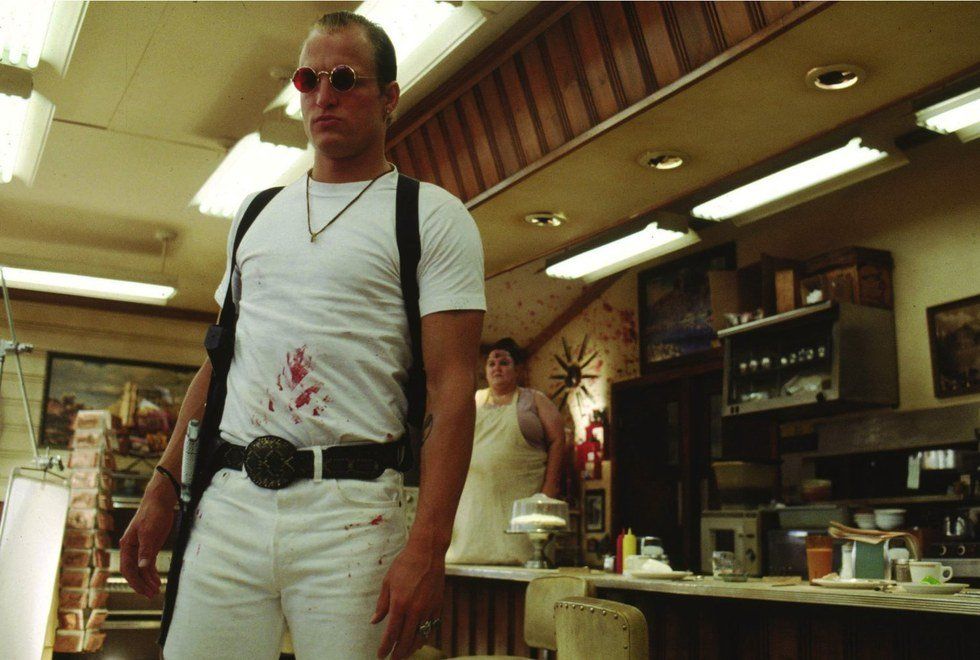Oliver Stone’s Natural Born Killers is a psychotic, hypnotic, trippy, nauseating, violent, ruthless, and evil mess. It attempts to expose the media’s extensive power in influencing the public, but all it really does is celebrate the horrific acts of its vial antiheroes, Mickey and Mallory Knox.
I’m not entirely sure how to express my disgust at these characters, but what I can say for sure is that I don’t ever recall disliking the protagonists of a film to this extent. Mickey and Mallory aren’t humans the audience can relate to, and they shouldn’t be characters that the audience can like or sympathize with. To call them human beings is to comment on what is on the outside because it would be absurd to suggest that there is even a trace of human nature on the inside. The only human emotion either of them have is love, but it is only for each other, and even that is questionable.
The only possible argument there is for pitying Mickey (Woody Harrelson) and Mallory (Juliette Lewis) is that both were sexually abused as children. The audience learns Mallory’s background first, with an amusing and creative segment presented like an old television sit-com entitled “I Love Mallory.” Her father (Rodney Dangerfield) is terrible – he demands, yells, and assaults his entire family. The ‘studio audience’ laughs when he grabs his daughter, and they cheer when Mickey walks in, like they know who he will become. But right now, he is delivering beef. This is when he sees Mallory for the first time, and it is here that both are at their most human, flirting and sweet talking their way to happiness. They sneak out with Dangerfield’s car while the rest of the family argues in the kitchen.
Mickey is arrested for stealing the car, but he quickly escapes, and returns to Mallory’s home, where they kill the father by drowning him in the fish tank and burn the mother alive. Mallory’s younger brother looks at the two new killers. He isn’t really that upset. “You’re free now,” Mallory tells him, and she and Mickey leave the house with a roar of applause behind them.
Soon after, they get “married” (they’re on a bridge looking out at the water. Mickey asks. Mallory accepts. They give each other rings with snakes on them, and by the power invested in him, Mickey declares them husband and wife. That’s it.), and off they go on a road trip to hell, killing almost everyone they come across. Sometimes they get something money out of the murders, but mostly they just seem to do it because they can. Who’s going to stop them? Enter Detective Jack Scagnetti (Tom Sizemore). He’s as famous as detectives get – his book “Scagnetti on Scagnetti” is a big hit. He becomes intrigued by the Knox’s crime spree and puts himself on the case.
Meanwhile, the media is having a field day – the Knox’s equal ratings; any footage of their ramparts are in high demand, and an interview with the one survivor the duo spares is golden. Shouts of “I love Mickey and Mallory” echo around the globe, and the public can’t get enough of them. Wayne Gale (Robert Downey Jr.), host of the successful tabloid American Maniacs, follows the story closely. He is intrigued by the money they bring in. He becomes important in the latter part of the film.
It is at about this time of mass hysteria that Mickey and Mallory’s downfall starts taking shape. One night while looking for a place to stay, they are taken in by a kind older Native American man and a child, who feed them and give them a warm fire to sleep by. Mickey has an intense flashback of his father, and ends up killing the old man. Mallory finally feels guilty about a murder. “What did you do Mickey?” She yells, pushing him out of the hut. “You evil people, what have you done?” The young boy screams.
Almost immediately after the kid runs away, both of the Knox’s are bitten by rattlesnakes, and they must retreat to a drug store. The clerk, who is watching news coverage of a Knox robbery (theoretically, like everyone is), pulls the silent alarm, and the police manage to arrest them. They’re thrown into a penitentiary run by the greedy and foulmouthed Warden Dwight McClusky (Tommy Lee Jones). He, like Gale, sees only the benefits he can receive through the Knox’s, and arranges to have Gale conduct an interview with Mickey. Not even the law understands the danger.
During the interview, which is projected throughout the prison, Mickey makes a remark (of which I will refrain from mentioning) that ignites a riot. This is the film’s climax – Mickey, during the commotion, commandeers a shotgun, and with Gale following closely behind, lets hell rain down upon everyone, much like he and Mallory did when they were free. It is a disturbing sequence of unnecessary and uninvited violence.
What is perhaps most frustrating about this film is that when it comes to delivering its message, it hits a bullseye. But by the time the end credits roll, the audience is so tired of that message – the message that has been getting pounded into their heads so ferociously for the past two hours – that it’s difficult to take its value seriously.




















